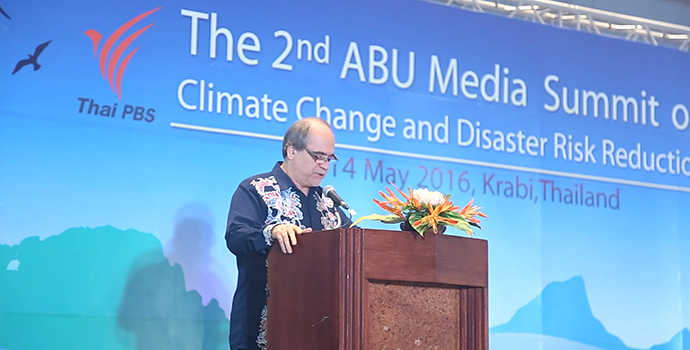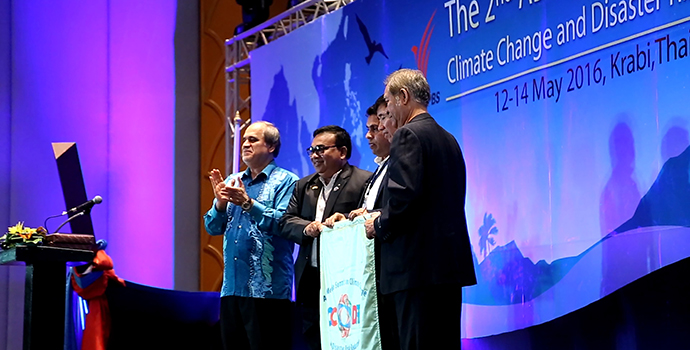- About Us
-
Who we are
-
- Publications
-
- ADPC Academy
-
MediaADPC'S NEWS
Media members and key stakeholders launch the Krabi Media Action Plan Media members and key stakeholders launch the Krabi Media Action Plan
12 - 14 May 2016
Krabi, Thailand
The The 2nd ABU Media Summit on Climate Change and Disaster Risk Reduction closed with the adoption of the Krabi Media Action Plan, a non-binding agreement for media professionals that outlines their responsibilities when reporting on disaster risk reduction and climate change.
The action plan covers the media’s role as influencers who communicate disaster risk, the impacts of a changing climate, and the need for consistent reporting on these issues. The agreement also states the importance of building partnerships with key stakeholders in the climate change and disaster risk reduction fields to promote disaster preparedness.
The action plan proceeds the Jakarta Statement of Commitment, the key output of the first ABU Media Summit in 2014. It also takes into account the four priority areas highlighted in the Sendai Framework for Disaster Risk Reduction and the Voluntary Commitment statement from the Media Stakeholder Group formed during the Third UN World Conference on Disaster Risk Reduction in Sendai 2015.
Dr. Javad Mottaghi, Secretary-General, Asia-Pacific Broadcasting Union, highlighted the importance of capacity building for the media to effectively deliver information to fulfill the commitments of the action plan.
Dr. Javad Mottaghi, Secretary-General, Asia-Pacific Broadcasting Union, delivers his closing remarks at the end of the Summit.“Broadcasters should be trained to deliver knowledge in a more attractive and acceptable manner, because sometimes the information is there, but if it’s not delivered appropriately the audience won’t listen,” said Dr. Mottaghi.
He added that with effective and targeted messaging the media can better reach and serve the public by educating them on the risks they face from natural disasters.
Darin Klong-ugkara, News Editor and Anchor of Environmental Disaster Issues, Thai PBS, emphasizes the role of the media when it comes to reporting on disaster preparedness and following the action plan.
“It is our duty as the media to report more on disaster risk reduction, to give people knowledge and share what to do during a disaster,” stated Ms. Klong-ugkara.
The official banner of the summit is handed over to the Bangladesh representatives in honor of next year's meeting.
Building the capacity of communities through reporting was one of the overarching themes during the Summit. Others include the importance of storytelling to change people’s attitudes regarding disaster preparedness, policy implementations to support the media’s efforts in pushing disaster risk reduction initiatives, understanding the target audience for better message delivery and utilizing key community members to reach a wider audience at the local level.
The action plan will remain in effect until the 3rd ABU Media Summit scheduled for May 2017 in Dhaka, Bangladesh, when the next document is developed based on the lessons learned from the Krabi Media Action Plan.
-